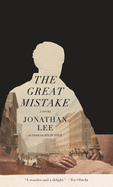
The Great Mistake begins with the murder of the historical figure Andrew Haswell Green (1820-1903), a city planner who was known in his day as the Father of Greater New York. Jonathan Lee's wondersome novel proceeds to piece together the events that led to Green's death, but the book's central mystery is psychological, not circumstantial: Why did someone so renowned for his civic contributions lead such an emotionally unfulfilling life?
Chapters dedicated to the city's investigation into Green's murder twine with chapters charting his past, from his inauspicious beginnings on a Massachusetts farm ("His family feared he might one day succumb to the catastrophe of being a poet") through his maturation into the person who helped establish such enduring Manhattan landmarks as Central Park and the Metropolitan Museum of Art. Green sought to "create work for himself that might fill him with pride instead of shame," but his shame wasn't restricted to his humble origins: Lee writes heartrendingly of a closeted romance between Green and Samuel J. Tilden, who would become the governor of New York.
Lee (High Dive) has done a masterly job reviving and embroidering the life of an undersung public figure who crossed paths with other notables; The Great Mistake features cameos by, among others, Green's occasional adversary Frederick Law Olmsted. With unshowy dexterity, Lee conjures the inner life of a man widely regarded as, the novel suggests, "a person who, in his last twenty years, had campaigned tirelessly against the idea of isolation, while himself remaining isolated." --Nell Beram, author and freelance writer

